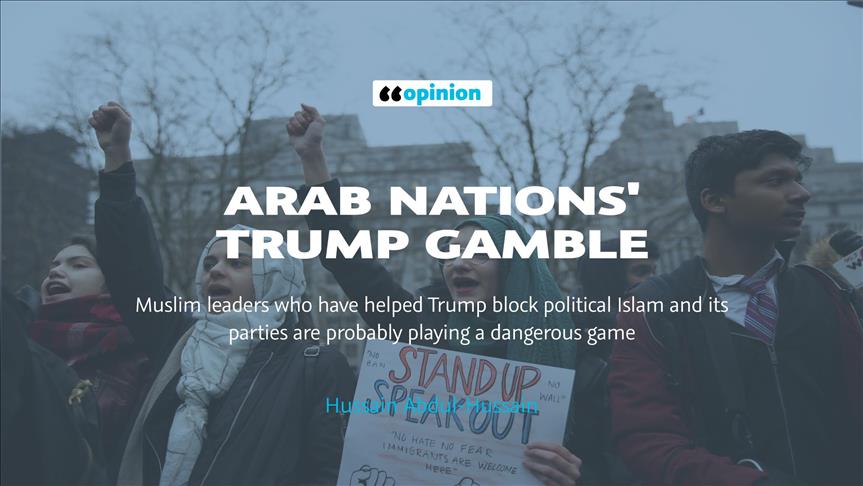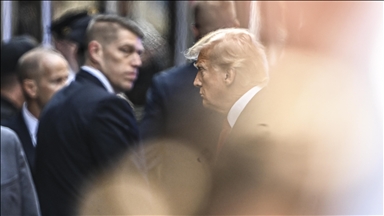
WASHINGTON

Muslims have been on top of President Donald Trump's list of enemies. During his electoral campaign, he called for a sweeping ban on the entry of all Muslims to the U.S., and for the creation of a database to register Muslim Americans. Once in power, Trump’s aggressive position against Muslims moderated, as he limited his travel ban to seven countries with Muslim majorities, and described his move as an "extreme vetting" precaution.
With a popular base consisting mainly of extreme right-wing Christians, it is understandable that Trump takes such aggressive positions against Muslims wholesale. What is puzzling, however, is that while millions of Americans -- including Christians and Jews -- protested Trump’s travel ban on Muslims, a few Muslim Arab officials have either voiced support of the ban, or ignored it.
The approach of Muslim countries
To understand the divided Muslim position on Trump, one has to delve into the divisions within the Arab and Muslim worlds. Arab countries are divided into two camps: One allows parties with Islamist platforms to participate in politics and run for public office, whereas the other prohibits political Islam wholesale and censors Islamist parties.
In the years that followed the Arab Spring of 2011 and the accession of Islamist parties to power, like in Egypt and Tunisia, the camp that opposes Islamist parties first sided with the reigning autocrats, and later with the military or secular opposition, until the opposition managed to retake power from the Islamists, like in Egypt. Not only these Muslim Arab countries banned Islamist parties at home, they lobbied regional organizations such as the Arab League and the Gulf Countries Council to classify Islamists as terrorists.
Kuwait's mediation efforts
A few countries, like the neutral Kuwait, launched a mediation effort between the two camps. Kuwait, one of the few Arab nations with a genuinely elected parliament and government, allows the formation of Islamist tickets, whose candidates run for election and often win sizable blocs. Kuwait said that it cannot criminalize its Islamists and called on fellow Arab capitals to differentiate between moderate Islamists, who should be allowed to participate in politics, and radical ones, who should be combated in ideas and on the battlefield.
Yet Kuwait’s mediation efforts failed to bridge the gap. Saudi Arabia and the United Arab Emirates (UAE) ended up banning Islamist groups and placing their parties, first and foremost the Muslim Brotherhood, on their lists of terrorist organizations. When the military overthrew the ruling Muslim Brotherhood (MB)-affiliated government in Egypt, Cairo joined Riyadh and Abu-Dhabi in criminalizing the MB and most other Islamist groups.
Saudi Arabia's moderated strategy on Sunni Islamism
Going against Sunni political Islam necessarily put countries like the UAE and Egypt in close proximity with Shiite Iran and its allies, mainly Syria's Bashar al-Assad and Lebanon's Hezbollah. But Iran's regional arch nemesis, Saudi Arabia, found it hard to fall in line behind the Iranians. As such, Riyadh moderated its position on Sunni Islamism as it considered Shiite Islamist parties, like the Lebanese Hezbollah and Iraqi pro-Iranian militias, as a threat as grave as radical Sunni groups.
As for countries that allow Islamists to participate in politics, these include Qatar, Turkey, Tunisia, and Egypt before a military coup overturned an elected Islamist government in the latter.
Muslim Arab rulers, like in Egypt and the UAE, who consider political Islam as an existential threat against their governments, saw in Trump a worthwhile ally. Egyptian President Abdel Fattah al-Sisi was the first to meet Trump in New York, even before Trump had assumed office. An Emirati businessman offered Trump $2 billion in investment partnership, most probably to buy favor with the newly elected American president. The Muslim Arab infatuation with Trump, and believing that it is possible to make common cause with him against fellow Muslims, might prove to be one of the most misguided policy choices for these governments.
The misconceptions of the Arabs who support Trump
While these Muslim Arab officials believe that Trump dislikes political Islam only, it is most probable that Trump cannot tell the difference between moderate Muslims or radical ones. Trump cannot tell the difference either between Islamic (in reference to religion) and Islamist (the reference to political Islam). Trump cannot tell the difference between Muslim and non-Muslim Arabs. When his short-lived travel ban was first instituted, a Christian Syrian family, which had just landed at an American airport, was sent back to Damascus.
To Trump and those driving his agenda, there are no real differences between Muslims, Arabs, Turks or Iranians. Trump and his supporters cannot see differences between Muslim and non-Muslim Arabs, or Muslim and non-Muslim Turks, or Muslim and non-Muslim Iranians. A family of Iranian Jews, whose members had emigrated to the U.S. a long time ago, was also detained at an airport while Trump's ban was still in effect and before the courts had taken it down.
"What drives Trump are advisors"
So Muslim Arab rulers who think Trump can tell the difference between a good Muslim and a bad one might be mistaken. What drives Trump are advisors who -- judging by their interviews and past statements -- see the world not as individuals, but as closed groups of nations. To these advisors, there are good nations and bad ones. There are civilized nations, mainly Western Christian ones, and uncivilized nations, especially the Muslims and the Chinese.
Those who know the nuances behind Trump’s Muslim travel ban understand that the ban was a test for a more comprehensive policy that aims at stemming the flow of immigrants, Muslims or non-Muslims, to the U.S. Muslim immigrants and refugees in the U.S. are just a trickle in a flood of immigrants from around the world, especially those from east and south Asia. Some of Trump’s advisors seem angry that Indians, for instance, have been taking high-paying technological jobs in Silicon Valley, at the expense of Americans. Again, in these advisors' minds, the world is divided into nations, and the Indian nation is not worthy of much respect like Christian nations.
Next probable threats against the Chinese and Indians
Trump's worldview, stirred mainly by those who identify themselves as traditionalists, is informed by fascist thought. Trump's policy, and ideology if any, is a menace to America first, and to the rest of the world second. This means that seeing in Trump an ally for short political gains might prove to be an ill-informed policy. Once Trump is done with the Muslims he dislikes the most, it might be only a matter of time before he goes after the Muslims who helped him get rid of other Muslims. And after Trump is done with Muslims, he might turn on the Chinese, the Indians or any other nation that his advisors consider of lower civilizational status than the West.
*Opinions expressed in this piece are the author’s own and do not necessarily reflect Anadolu Agency's editorial policy.
Anadolu Agency website contains only a portion of the news stories offered to subscribers in the AA News Broadcasting System (HAS), and in summarized form. Please contact us for subscription options.


